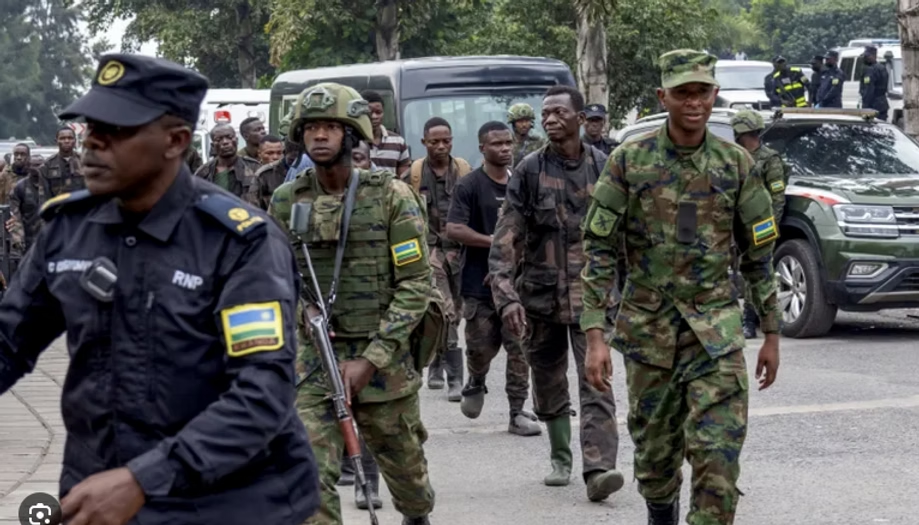Democratic Republic of the Congo Genocide Emergency 2025
AFRICA, 6 Oct 2025
Omar Kausar | Genocide Watch - TRANSCEND Media Service
1 Oct 2025 – Since 1996, wars and ethnic conflicts in the Democratic Republic of the Congo (DRC) have caused six million deaths. The First Congo War began after the 1994 Genocide Against the Tutsis in Rwanda when up to two million Hutus crossed into the DRC and sought refuge in camps in North and South Kivu. Perpetrators of the Rwandan genocide formed militias in the DRC, where they continued killing Congolese Tutsis, the Banyamulenge. In response, Congolese Tutsis formed the M23 militia.
During the First and Second Congo War (1996-1997, 1998-2003), millions of civilians were killed and over 100 armed militias emerged. These militias fight primarily to control the DRC’s abundant natural resources. One of the most active groups is the March 23 Movement (M23), composed mainly of ethnic Tutsis and backed by the Rwandan government.
In January 2025, M23 launched a new offensive against the Congolese Security forces and recaptured Goma, the regional hub of eastern DRC. The offensive involved 3000 to 4000 troops and displaced over 100,000 people. According to the United Nations (UN), Up to 2000 civilians have been killed as M23 captured rich mining areas. M23 and other ethnic militias have committed numerous massacres.
As a result, one million Congolese have sought refuge abroad, and 21 million people in the country require urgent aid, creating one of the world’s deadliest humanitarian disasters. As of 30 April 2024, the UN Organisation Stabilisation Mission in the DRC (MONUSCO) ended operations in South Kivu by transferring several bases to Congolese authorities.
In the DRC, hundreds have died of cholera, with 9 out of 11 health zones affected and over 1450 confirmed cases, according to the UN. There is widespread displacement and a severe hunger crisis.
The UN International Children Emergency Fund (UNICEF) reports a surge in sexual violence against women and children, with thousands of new cases in two months. Of 10,000 documented cases of rape and sexual violence, children make up 45% of victims – equivalent to one child raped every 30 minutes.
Under International Humanitarian Law (IHL), the wounded and sick must be protected, yet M23 stormed a hospital in Goma and took hundreds of patients hostage, according to Amnesty International. Journalists and aid workers have been killed. M23 and other ethnic militias have committed international crimes, including arbitrary arrests and detention, rapes, and many massacres, and mass graves.
On 27 June 2025 Rwanda and the DRC signed a peace agreement. But M23 has not signed or disarmed.
Genocide Watch deems the DRC to be at:
Stage 3: Discrimination,
Stage 4: Dehumanization,
Stage 5: Organization,
Stage 6: Polarization,
Stage 8: Persecution, and
Stage 9: Extermination.
Genocide Watch Recommends:
- Rwanda and DRC must demand that M23 sign the 27 June 2025 peace agreement and disband.
- The UNSC should reauthorize a UN and AU peacekeeping operation in the DRC.
- Rwanda must cease supporting and financing the M23 militia and oversee its disarmament.
- Rwanda and DRC must launch a joint military operation to disband and disarm militias in eastern DRC.
- The International Criminal Court (ICC) should investigate the leadership of M23 and other militias.
Tags: Africa, D.R. Congo, Ethnic Cleansing, Genocide, Hutus, Rwanda, Tutsis
DISCLAIMER: The statements, views and opinions expressed in pieces republished here are solely those of the authors and do not necessarily represent those of TMS. In accordance with title 17 U.S.C. section 107, this material is distributed without profit to those who have expressed a prior interest in receiving the included information for research and educational purposes. TMS has no affiliation whatsoever with the originator of this article nor is TMS endorsed or sponsored by the originator. “GO TO ORIGINAL” links are provided as a convenience to our readers and allow for verification of authenticity. However, as originating pages are often updated by their originating host sites, the versions posted may not match the versions our readers view when clicking the “GO TO ORIGINAL” links. This site contains copyrighted material the use of which has not always been specifically authorized by the copyright owner. We are making such material available in our efforts to advance understanding of environmental, political, human rights, economic, democracy, scientific, and social justice issues, etc. We believe this constitutes a ‘fair use’ of any such copyrighted material as provided for in section 107 of the US Copyright Law. In accordance with Title 17 U.S.C. Section 107, the material on this site is distributed without profit to those who have expressed a prior interest in receiving the included information for research and educational purposes. For more information go to: http://www.law.cornell.edu/uscode/17/107.shtml. If you wish to use copyrighted material from this site for purposes of your own that go beyond ‘fair use’, you must obtain permission from the copyright owner.
Join the discussion!
We welcome debate and dissent, but personal — ad hominem — attacks (on authors, other users or any individual), abuse and defamatory language will not be tolerated. Nor will we tolerate attempts to deliberately disrupt discussions. We aim to maintain an inviting space to focus on intelligent interactions and debates.

